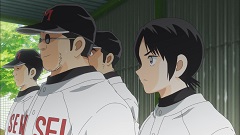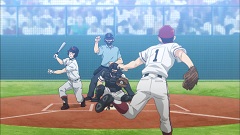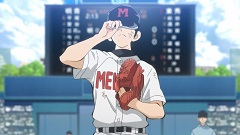Mix is, by my count, the eighth Mitsuru Adachi work to be adapted to animation. I’ve only seen one of the other seven, so it may not be my place to say this, but Mix probably ranks around the middle of those eight. Its main cast is complex, but the non-baseball players among them slip from the series’ focus near the end. Its visual presentation is drab, only springing to life during isolated scenes. Depending on which source you use to watch the show, you may experience a crippling audio issue that buries the dialogue beneath a string-heavy soundtrack (I recommend Commie’s version, which fixed this problem). And yet, for all its shortcomings, Mix retains that signature Adachi atmosphere of emotional realism, mixed with an unpredictability on the baseball diamond that keeps things fresh. The characters may not have completed their arcs in this truncated adaptation, but they’re still the lifeblood of the show.
If its cast of characters is its lifeblood, then the Tachibanas are Mix’s heart. They’re a mixed family born of the remarriage of two parents, whose children exhibit a nuanced relationship during the show’s run. Touma and Souichiro’s rivalry goes far beyond the one-note envy that consumes other anime siblings – there are layers of mutual admiration and suppressed resentment between them from the start. They’re a pitcher and catcher, respectively, and though Souichiro has ambitions of pitching someday, he’s willing to defer his dream for the sake of their team. The slow pace at which this desire unfolds and then fades is one of Mix’s best story threads – another is the impact that her father’s death has on little sister Otomi, whose cheerful energy disappears one night when she reflects on her hazy memory of the man. Touma’s own refusal to grieve for his mother’s passing gives their pairing in this scene a lot of weight, as you realize the support they must lend each other in the wake of their twin tragedies.
The series begins in middle school, then progresses to high school around the one-third mark. There are plenty of other fun and worthwhile characters introduced during both phases, though the first eight or so episodes can feel like part of a holding pattern at times. Even after the older kids reach high school, Otomi must complete her final year at Meisei Middle, and the show sometimes indulges in a trifling romantic plot with her at the center. Much better is high school team manager Haruka’s initial interest in Touma, and Souichiro’s adjacent crush on her, creating a love triangle that’s always worth a chuckle or a knowing smile. This romantic element, and the majority of other non-baseball plots, fade away towards the end as the series gives itself over to its major tournament arc. Given its anticlimactic conclusion, this decision doesn’t feel wholly justified – nor does the show’s fixation on the past, including what happened to Meisei High in the years following Touch’s conclusion. Some of its flashbacks aid in characterizing Mix’s present day parents, however.
Though I have some criticisms of the show’s narrative focus and trajectory, its status as a work of animation is far less positive. To put it plainly, Mix’s looks are below average for a TV anime. I haven’t tired of Adachi’s trademark designs yet, but the series rarely puts them through any noteworthy motion, such as running the base paths or gesturing in multiple directions. Pitchers’ forms are given special attention, and the swings of the batters look nice, but apart from that, you’re in for a lot of panning shots over static characters and vanilla backgrounds (especially during interior scenes). It should be noted that, every once in a while, the series will pull a veteran baseball animator out of its back pocket for a cut like this one, but these moments are few and far between. The show also uses VCR scene transitions and character intro cards that can throw viewers for a loop – these make regular appearances near the start, but gradually disappear once the show settles in for the long haul.
Clearly I was disappointed in Mix’s visuals. But make no mistake: I liked the show, and I consider it the best sports anime of 2019 thus far. Its cast of characters is among the best of the year, and there are at least half a dozen standout scenes popping into my head right now that I didn’t have time to discuss. My episode reviews for the show were mostly positive, and that’s how I feel about the finished product, too, so it gets my recommendation. If you’re looking for the next Cross Game, you’ll have to look elsewhere, but if you want a character-focused baseball series with fun slices of life between its matches, Mix is a home run.






